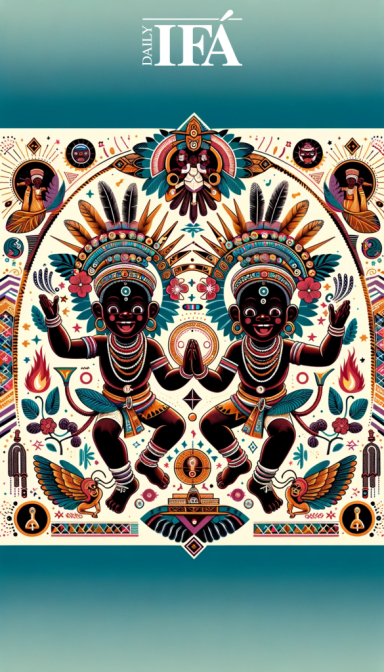
About ORISHÀ IBEJI
The Divine Twins of Yoruba Mythology. Orishá Ibeji, central to Yoruba religion and its diasporic traditions, represents the sacredness of twins. The term "Ibeji" is derived from "ìbí" (to give birth) and "ejì" (two), signifying the birth of twins. In Yoruba culture, twins are considered magical and divine, often viewed as reincarnated ancestors and holding a revered status in society.
Ibeji's influence extends beyond the spiritual, offering practical guidance and protection in daily life. For families with twins, Ibeji holds a particularly special place, symbolizing the extraordinary nature of twin births. The worship of Ibeji fosters a deep connection with ancestral traditions and cultural heritage. By guiding individuals through life's dualities and joys, Ibeji’s presence in a person's life is nurturing and transformative.
About the ORISHÁ
Roles and
Influence
- Protectors: Ibeji are believed to hold protective powers, safeguarding not only twins but also their families against misfortune and untimely demise.
- Divine Children: Twins are seen as divine children of Shango, the deity of thunder and lightning, embodying magical qualities and wisdom from the spiritual realm.
- Bringers of Fortune or Misfortune: Their connection to Shango attributes them the power to bring both good fortune and misfortune, reflecting the duality of life.
- Intercessors: Ibeji can intercede with the gods on behalf of their families, playing a crucial role as intermediaries between the human and spiritual realms.
- Reincarnated Ancestors: In Yoruba belief, twins are considered reincarnated spirits of deceased ancestors, symbolizing the cycle of life, death, and rebirth.
- Economic Prosperity and Spiritual Growth: Ibeji draws forth economic prosperity, fosters spiritual growth, and balances the material and spiritual realms.
- Oracles and Guides: Ibeji figures can serve as oracles, providing hidden knowledge and guidance through their symbolic language.
Characteristics and Symbolism
- Names and Roles: The firstborn twin is named Táíwò (the inaugural child), while the second assumes the name Kéhìndé (the elder one, spiritually senior).
- Guardianship: Ibeji serves as guardians against material and spiritual distress, guiding the inner consciousness (ori) of devotees towards the right path.
- Duality and Balance: They embody the concept of duality, symbolizing the balance between existence and non-existence, action and inaction.
- Challenges and Blessings of Twin Birth: The birth of twins presents challenges and blessings for parents, contingent on how they nurture them. Reverence for twins as semi-divine beings is essential, along with balancing energies between siblings to prevent disparities.
- Worship Practices: Worship of Ibeji involves no initiation or possession rituals. Reverence is bestowed upon individuals dedicated to veneration, emphasizing the importance of respect for the deity and its representatives.
Key Manifestations (Aspects)
Specific manifestations of Ibeji are not known. In the myths, only certain aspects of one or the other are highlighted. However, the two siblings can also be viewed and invoked individually. There is also a third brother who is of great importance.
The meaning of the names of the Jimaguas, the two Ibejis: The older of the sacred twins is named Taiwo, a name derived from the contraction of the expression To-aiyo-wo (the first to taste the world), while the second is named Kehinde, a name derived from the expression Ko-ehin-de (the one who comes after another person).
Sign-Up for free to your Weekly Newsletter.
Illustrations of the Orishá
Wir benötigen Ihre Zustimmung zum Laden der Übersetzungen
Wir nutzen einen Drittanbieter-Service, um den Inhalt der Website zu übersetzen, der möglicherweise Daten über Ihre Aktivitäten sammelt. Bitte überprüfen Sie die Details in der Datenschutzerklärung und akzeptieren Sie den Dienst, um die Übersetzungen zu sehen.




